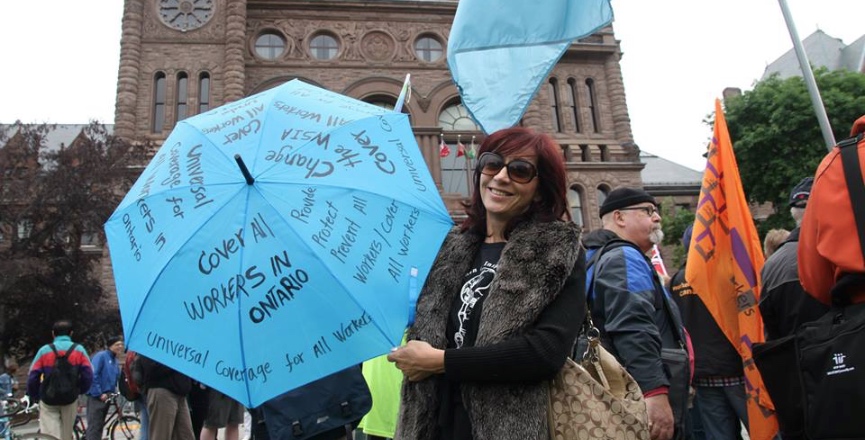As an early childhood education (ECE) teacher at a private school in Toronto, Maryam Nazemi had a physically strenuous job. The school was located in a church, and classrooms had to be dismantled every Friday and put back together on Monday mornings, requiring her to lift heavy furniture.
Combined with the arduous task of managing an autistic child along with groups of young children, the job took a physical toll on Nazemi, ultimately leading to a spinal cord injury.
Unlike workers whose employers are covered by Ontario’s Workplace Safety and Insurance Board (WSIB), Nazemi was not eligible to continue receiving her wages or any other form of compensation.
Shortly after her spinal cord surgery, her employer called to say that her next cheque would go through despite her missing work, but that they would need to find a way for her to pay it back in the future.
The lack of a social safety net at this crucial juncture in her life was traumatic. The cost of medication, the debilitating pain and inability to care for her children profoundly impacted her well-being.
“I was just kind of taking that first step towards dying, losing life, being isolated,” Nazemi says. “But at the same time, I had two young kids, four and a half and eight years-old. And therefore, I think the love that I had for them [helped me move forward].”
The uninsured
The Ontario Compensation Employees Union recently launched its Cover Me WSIB campaign, advocating universal coverage for all injured workers. OCEU is a CUPE local that represents over 3,400 WSIB employees.
Ontario and Nova Scotia are the only two provinces that have an “inclusionary” workers’ compensation system, whereby legislation specifies industries that are mandated to provide coverage. All other industries are subsequently left out.
In other provinces, all workers are automatically covered by the compensation board except those employed in exempted industries.
OCEU estimates that 23 per cent of Ontario’s workers, nearly 1.7 million people, are currently uninsured by WSIB. The case of Maryam Nazemi is a chilling example of the kind of devastating impact workers can face due to lack of coverage.
“We’ve had a number of cases where [injured workers] come to us and it’s unfortunate that their industry is not covered,” says Harry Goslin, president of OCEU.
In addition to providing income insurance for disabled workers, WSIB also covers rehabilitation and retraining services. Uninsured employers may not provide those services as they are not obligated to do so.
Goslin says that for workers fortunate enough to be unionized, bargaining for insurance shifts focus away from other important requirements.
“They have to try and bargain that as part of their collective agreement,” Goslin says. “And usually there’s something that they end up trading to try to gain that right.”
The economic case for employers
The OCEU commissioned an economist to look at the impact of universal coverage on businesses. The economist’s report makes the case that it would be financially beneficial for both current employers on WSIB and many of those who are outside its purview.
WSIB pays $258 million for province-wide health and safety programs that benefit all businesses, including those not part of the compensation system. That cost can be distributed among a larger group of employers.
Moreover, universal coverage would lower WSIB premiums across the board as more employers paying into the pool would spread the risk of injuries more equitably.
Currently, employers not mandated to provide compensation have one of three options: voluntarily sign onto WSIB, buy private insurance or do nothing.
Goslin says that for employers who opt for private insurance, WSIB is a cheaper option.
“What we find is when employers actually do [sign onto WSIB] it ends up costing them less than it would be for their disability insurance by a private carrier,” he says. “Once they find that out, a lot of them jump on board.”
But until employers come to that realization, workers are left to fend for themselves.
And then there are employers who provide no type of insurance at all, such as in the case of Nazemi.
The burden on taxpayers
Goslin says that uninsured workers end up costing more money to taxpayers as they rely on publicly-funded programs such as OHIP, Ontario Disability Support Program and Ontario Works for medical costs and income security. OCEU estimates that universal coverage would result in OHIP savings of $128.5 million.
The monetary impact on social assistance programs is tough to calculate, Goslin says.
In Nazemi’s case, she was rejected for ODSP and OW due to her husband’s income being just above the threshold for eligibility — eroding her own financial independence.
A long-standing demand
Injured workers’ groups and their advocates have long demanded universal coverage. They argue that women workers are often most marginalized by the system as they tend to be over-represented in the uncovered service sector.
According to OCEU, of the approximately 1.7 million uncovered workers, about 330,000 workers are employed in the finance and insurance sector, a similar number of people in the health care and social assistance, and about 130,000 in the private education system.
Demands for universal coverage among injured workers have been supported by multiple reviews, including the government-commissioned Jackson report in 1996 and the WSIB-sponsored Brock Smith report in 2002.
However, the Liberal government admitted in 2006 that it wasn’t considering universal coverage when pressed by NDP’s Andrea Horwath in a legislative debate. It did expand coverage in 2008 to include independent operators and some construction workers.
The OCEU’s campaign includes a petition to legislate universal coverage, as the Ontario government reviews WSIB.
The Ontario minister of labour declined to be interviewed.
Zaid Noorsumar is rabble’s labour beat reporter for 2019, and is a journalist who has previously contributed to CBC, The Canadian Press, the Toronto Star and Rankandfile.ca. To contact Zaid with story leads, email zaid[at]rabble.ca.
Image: Maryam Nazemi



